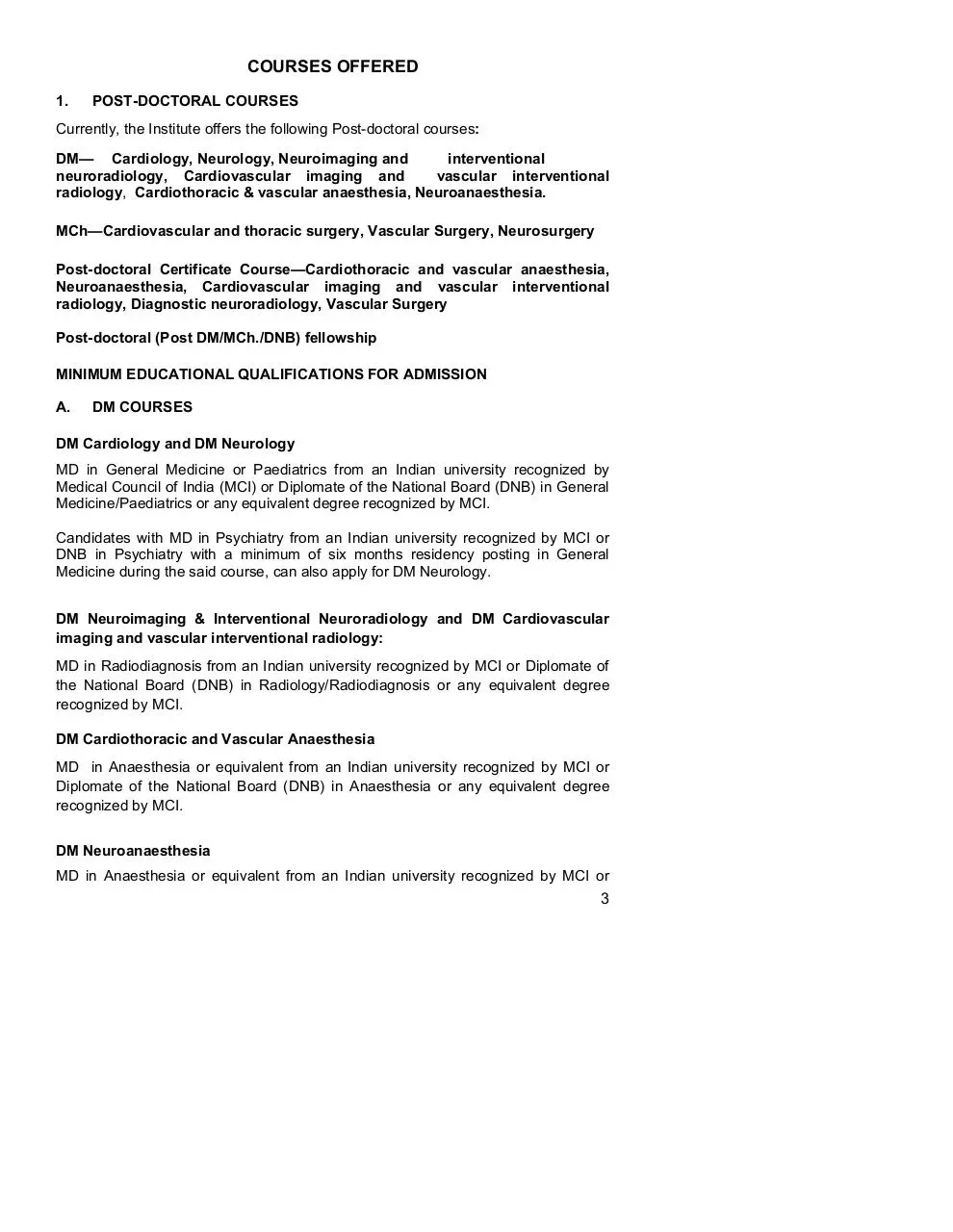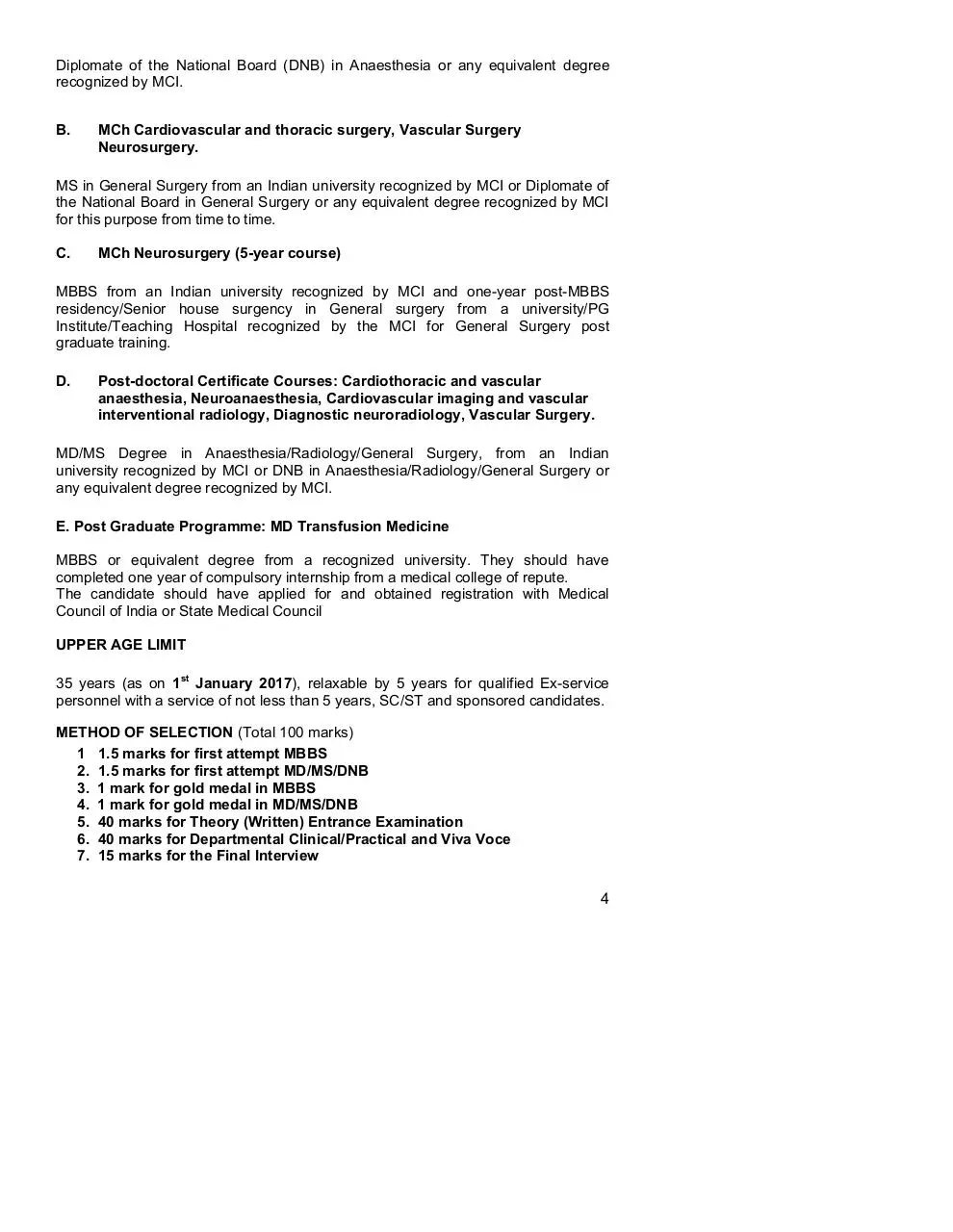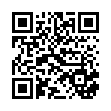Sri Chitra Prospectus 2017 (PDF)
File information
Author: office_supdt
This PDF 1.6 document has been generated by Microsoft® Office Word 2007, and has been sent on pdf-archive.com on 02/02/2017 at 16:58, from IP address 49.206.x.x.
The current document download page has been viewed 804 times.
File size: 2.01 MB (56 pages).
Privacy: public file





File preview
CONTENTS
Page No.
Introduction
1
Programme on offer 2017
2
Post-doctoral programme DM/MCh/PDCC
3
Post DM/MCh Fellowship
8
Salary/Stipend
13
Fees Structure
14
Specialty Nursing Programme
15
PG Diploma/ Diploma Programme
16
Advance Certificate Programme
18
Special Information
20
Application procedure
22
Hall Ticket/Call letter
23
Ph.D Programme
25
AMCHSS –MPH
28
DPH
30
BMT Wing
31
Joint Programmes
36
Affiliated programmes
39
Important dates of admission/Schedule of examinations
48
Important Contact Addresses
53
INTRODUCTION
Sree Chitra Tirunal Institute for Medical Sciences and Technology (SCTIMST)
became an Institute of National Importance with the status of a University under the
Department of Science and Technology, Govt. of India by an Act of Parliament (Act
52 of 1980). The joint culture of medicine and technology that the Institute pioneered
more than three decades ago has come of age and gained unprecedented
acceptance in India. Imbued with an inclination to venture into less-trodden domains,
the Institute focuses on patient care of high quality, technology development of
industrial significance and health research studies of social relevance. The
emphasis is on development of facilities less readily available elsewhere in the
country such as interventional radiology, cardiac electrophysiology, presurgical
evaluation and surgery for epilepsy, microsurgery and deep brain stimulation for
movement disorders, new biomedical devices and products, evaluation of medical
devices to global specifications, new academic programmes and global public health
networks.
The Institute has three wings – the Hospital Wing, the Biomedical Technology Wing
and the Achutha Menon Centre for Health Science Studies Wing. Excellent research
and learning opportunities are available at these wings. This uniquely poised
Institute has a dedicated team of clinicians, scientists and engineers devoted to high
quality biomedical research, technological development and public health research.
The Institute‘s missions are:
Promote research and development in biomedical engineering and
technology
Deliver high quality patient care in selected specialties and
subspecialties
Develop innovative postgraduate training programmes in advanced
medical specialties, and biomedical engineering and technology.
Participate in public health reforms through research, training and
interventions.
The Sree Chitra Tirunal Institute for Medical Sciences & Technology Act, 1980,
empowers the Institute to sponsor post-graduate programmes in medical sciences
and biomedical engineering and stipulates that the medical degrees, diplomas and
other academic distinctions granted by the Institute shall be recognized
qualifications for the purpose of the Indian Medical Council Act and that they shall be
included in the First Schedule to the Act.
1
PROGRAMMES ON OFFER - 2017
Post-doctoral courses
Ph.D./Master’s
Other Programmes
1.
DM Cardiology
17. MD in Transfusion medicine
Joint Programmes:
(for details please see page no 36 to 38
2.
DM Neurology
18. Master of Public Health (MPH)
(1) M Tech. (Clinical Engineering)
3.
DM Neuroimaging and
interventional neuroradiology
4.
DM Cardiovascular imaging and
vascular interventional radiology
5.
DM Cardiothoracic & vascular
anaesthesia
6.
DM Neuroanaesthesia
7.
MCh Cardiovascular &
thoracic surgery
8.
MCh Neurosurgery (after M.S)
9.
MCh Vascular Surgery
10. MCh Neurosurgery—5-year
course (after MBBS and 1 year
Senior housesurgency/
Residency in General Surgery)
11. Post-doctoral certificate course
in Cardiothoracic and
vascular anaesthesia
12. Post-doctoral certificate course
in Neuroanaesthesia
13. Post-doctoral certificate course
in Cardiovascular imaging and
vascular interventional radiology
14. Post-doctoral certificate course in
Diagnostic neuroradiology
19. M Phil (Biomedical Technology)
(2) Ph.D. (Biomedical Devices and
Technology)
20.Ph.D
Affiliated Programmes with other
Centres: (pl. refer page no. 39 to 46)
Diplomas
A.
(2)
National Institute of
Epidemiology, Chennai:
Master of Public Health
(Epidemiology and Health Systems)
Ph.D in Public Health
B.
Christian Medical College, Vellore.
(1)
Master of Science Bioengineering
(2)
Ph.D.in Bioengineering/Public
(1)
21. Diploma in Public Health
22. Diploma in Cardiovascular &
Thoracic Nursing
23. Diploma in Neuro-Nursing
24. Diploma in Operation Theatre
Technology
25.Diploma in Advanced Medical
Imaging Technology
PG Diplomas
26.Cardiac Laboratory Technology
27.Neuro-Technology
28.Medical Records Science
29.Clinical Perfusion
30.Blood Banking Technology
Health/Biomedical Sciences
(3)
Master of Public Health (MPH)
C. IIITMK, Trivandrum
(1) Ph.D (For Engineering Graduates)
D. IIPH, New Delhi
(1) Master of Public Health
Advanced Certificate
31. Advanced Certificate
Programmes in Physiotherapy
15. Post-doctoral certificate course in
Vascular Surgery
16. Post-doctoral fellowship
(Post DM/MCh./DNB)
2
COURSES OFFERED
1.
POST-DOCTORAL COURSES
Currently, the Institute offers the following Post-doctoral courses:
DM— Cardiology, Neurology, Neuroimaging and
interventional
neuroradiology, Cardiovascular imaging and
vascular interventional
radiology, Cardiothoracic & vascular anaesthesia, Neuroanaesthesia.
MCh—Cardiovascular and thoracic surgery, Vascular Surgery, Neurosurgery
Post-doctoral Certificate Course—Cardiothoracic and vascular anaesthesia,
Neuroanaesthesia, Cardiovascular imaging and vascular interventional
radiology, Diagnostic neuroradiology, Vascular Surgery
Post-doctoral (Post DM/MCh./DNB) fellowship
MINIMUM EDUCATIONAL QUALIFICATIONS FOR ADMISSION
A.
DM COURSES
DM Cardiology and DM Neurology
MD in General Medicine or Paediatrics from an Indian university recognized by
Medical Council of India (MCI) or Diplomate of the National Board (DNB) in General
Medicine/Paediatrics or any equivalent degree recognized by MCI.
Candidates with MD in Psychiatry from an Indian university recognized by MCI or
DNB in Psychiatry with a minimum of six months residency posting in General
Medicine during the said course, can also apply for DM Neurology.
DM Neuroimaging & Interventional Neuroradiology and DM Cardiovascular
imaging and vascular interventional radiology:
MD in Radiodiagnosis from an Indian university recognized by MCI or Diplomate of
the National Board (DNB) in Radiology/Radiodiagnosis or any equivalent degree
recognized by MCI.
DM Cardiothoracic and Vascular Anaesthesia
MD in Anaesthesia or equivalent from an Indian university recognized by MCI or
Diplomate of the National Board (DNB) in Anaesthesia or any equivalent degree
recognized by MCI.
DM Neuroanaesthesia
MD in Anaesthesia or equivalent from an Indian university recognized by MCI or
3
Diplomate of the National Board (DNB) in Anaesthesia or any equivalent degree
recognized by MCI.
B.
MCh Cardiovascular and thoracic surgery, Vascular Surgery
Neurosurgery.
MS in General Surgery from an Indian university recognized by MCI or Diplomate of
the National Board in General Surgery or any equivalent degree recognized by MCI
for this purpose from time to time.
C.
MCh Neurosurgery (5-year course)
MBBS from an Indian university recognized by MCI and one-year post-MBBS
residency/Senior house surgency in General surgery from a university/PG
Institute/Teaching Hospital recognized by the MCI for General Surgery post
graduate training.
D.
Post-doctoral Certificate Courses: Cardiothoracic and vascular
anaesthesia, Neuroanaesthesia, Cardiovascular imaging and vascular
interventional radiology, Diagnostic neuroradiology, Vascular Surgery.
MD/MS Degree in Anaesthesia/Radiology/General Surgery, from an Indian
university recognized by MCI or DNB in Anaesthesia/Radiology/General Surgery or
any equivalent degree recognized by MCI.
E. Post Graduate Programme: MD Transfusion Medicine
MBBS or equivalent degree from a recognized university. They should have
completed one year of compulsory internship from a medical college of repute.
The candidate should have applied for and obtained registration with Medical
Council of India or State Medical Council
UPPER AGE LIMIT
35 years (as on 1st January 2017), relaxable by 5 years for qualified Ex-service
personnel with a service of not less than 5 years, SC/ST and sponsored candidates.
METHOD OF SELECTION (Total 100 marks)
1 1.5 marks for first attempt MBBS
2. 1.5 marks for first attempt MD/MS/DNB
3. 1 mark for gold medal in MBBS
4. 1 mark for gold medal in MD/MS/DNB
5. 40 marks for Theory (Written) Entrance Examination
6. 40 marks for Departmental Clinical/Practical and Viva Voce
7. 15 marks for the Final Interview
4
Note:
a.
For calculating the marks for eligibility for admission to these courses, 1.5
marks will be given for clearing MBBS in the Ist attempt, 1.5 marks for clearing
MD/MD/DNB in the first attempt, 1 mark for gold medal winners during MBBS
course, 1 mark for gold medal winners in MD/MS/DNB. Candidates with more
than two failures will not be called for the entrance examination.
b.
All candidates called for assessment should appear for a theory examination of
90 minutes duration, carrying 100 multiple choice questions, half of which will
be from the Post doctoral specialty applied for and the other half from the
qualifying post-graduate speciality . For DM Neurology the entrance paper for
Medicine and Psychiatry stream will be common with 50 Gen Medicine and 50
Neurology questions. OMR will be used for evaluation of answer sheets.
Theory examination will be based on the core post-graduate specialty and postdoctoral specialty applied for.
The minimum pass marks in Theory Examination will be 50%. Candidates
scoring less than the minimum prescribed will not be considered.
c.
d.
Out of the candidates who have qualified in the Theory Examination, a merit list
will be drawn up based on the marks obtained in the Theory Examination. From
the said merit list, candidates will be selected in the order of merit for further
evaluation - clinical, practical and viva voce in the respective departments. The
ratio of candidates selected for these will be approximately three candidates for
each available vacancy.
e.
The candidates for the final interview will be selected in the order of merit based
on aggregate marks scored for academic performance including theory and
departmental clinical/practical and viva-voce (aggregate of 1 to 6 under method
of selection). The proportion of candidates called for the final interview will be
two per available seat in each discipline. However three candidates may be
shortlisted for the final interview in a programme with one seat only.
f.
Candidates will be notified of their provisional selection immediately after the
Entrance Examination. The final announcement will carry the names of selected
candidates (in serial order), wait-listed candidates (in rank order), and those
eligible for Institute scholarship. The number of wait-listed candidates will not
exceed that of the selected. Selection will be purely on merit, based on the
methods of assessment indicated.
g.
For Anaesthesia specialities:
Candidates can apply for Cardiothoracic and Vascular Anaesthesia specialty or
for Neuroanaesthesia specialty. Examinations are different for the two
specialties. The entrance examination is common for both DM and PDCC
courses in the same specialty.
5
There will be a common application form for both DM and PDCC (DM
Cardiothoracic & Vascular Anaesthesia speciality or for Neuroanaesthesia
speciality) programmes. A candidate should submit only one application
form for a speciality.
The candidate has 3 options to apply for the programs:
1.
2.
3.
To apply only for DM programme (Group I).
To apply for both DM and PDCC programme with the aim of joining
either of them whichever would be available to him/her based upon
ranking in the final examination (Group II).
To apply only for PDCC (Group III).
Theory examination will be common both for DM and PDCC.
Only those candidates who successfully pass the theory examination will be
considered for departmental examination. Candidates equal to 3 times the
total number of seats (DM plus PDCC) will be selected for departmental
examination. However, maximum number of candidates among them, who
apply for group I (DM program only), will not exceed 3 times the number of
DM seats.
Only those candidates who successfully pass the departmental examination
will be considered for the final interview. At the end of the departmental
examination, all candidates will be rank listed according to the score
obtained. Candidates equal to twice the number of seats (DM plus PDCC)
will be selected for final interview. However, maximum number of
candidates among them, who are in group I (DM program only), will not
exceed 2 times the number of DM seats.
Only those candidates who successfully pass the final interview will be
considered for admission counseling. A merit list will be created after final
interview & counseling.
The candidates for DM seats will be selected from group I and group II
according to the merit order. Number of candidates equal to the number of
DM seats will be kept in the waiting list for DM. However, those candidates
from group II, who are included in DM waiting list, can also compete for
PDCC seats. They may join the DM program depending upon their merit
order if a DM seat falls vacant at a later date. A candidate who joins the DM
course will not be permitted to change over to PDCC at a later date.
The candidates from Group II and Group III will compete for PDCC. Those
who are not selected for PDCC, will be kept in the PDCC waiting list.
6
h. For Radiology specialties:
Candidates can apply for Cardio Vascular Radiology
specialty(DM/PDCC IN CARDIOVASCULAR IMAGING AND
VASCULAR INTERVETIONAL RADIOLOGY) or for Neuroradiology
specialty(DM - NEUROIMAGING AND INTERVENTIONAL
RADIOLOGY /PDCC- Diagnostic neuroradiology). Examinations
are different for the two specialties. The examination is common for
both DM and PDCC courses in the same specialty.
There will be a common application form for both DM and PDCC
programmes in each specialty. A candidate should submit only
one application form and for only one specialty.
Theory examination will be common both for DM and PDCC in
each specialty.
Only those candidates who successfully pass the theory
examination will be considered for departmental examination.
Candidates equal to 3 times the total number of seats (DM plus
PDCC) will be selected for departmental examination. Only those
candidates who successfully pass the departmental examination
will be considered for the final interview. At the end of the
departmental examination, all candidates will be rank listed
according to the score obtained. Candidates equal to twice the
number of seats (DM plus PDCC) (separately for two specialties),
will be selected for final interview. Only those candidates who
successfully pass the final interview will be considered for merit list
and counseling. A common merit list for DM and PDCC will be
created after final interview and for each specialty separately and
be called for counseling.
The candidates for DM and PDCC seats will be selected in each
specialty according to the merit order and choice of the candidate
in the merit order at the counseling after the final interview. Number
of total candidates (DM + PDCC) equal to the number of seats will
be kept in the waiting list for each specialty. In the event of vacancy
arising within the stipulated time, for DM/ PDCC in the concerened
specialty, waitlisted candidates will be intimated to join in the order
of merit and choice of the candidate in accordance with the
prevailing institute rules. A candidate who joins the DM course will
not be permitted to change over to PDCC at a later date, however
7
PDCC candidates can opt for DM seat in the event of a vacancy
within the stipulated time.
i.
The panel of candidates selected for DM/MCh. courses will be valid for a
period of six months from 1st January of each year. Any vacancy occurring
before
1st February will be filled from the waiting list. Any candidate from
the waiting list admitted against a vacant seat who fails to join on or before
January 31st will be admitted to the course only on 1st July of that year. All
candidates shall, however, undergo the period of training prescribed for the
course before being permitted to appear for the final examination.
Note: (1) One seat in DM Cardiology is normally reserved for candidates with MD in
Paediatrics or its equivalent qualification. However, in the absence of
suitable candidates, the seat will be filled from candidates with MD in
General Medicine. So also, MD Paediatrics candidates may be admitted
to general seats if found suitable. Students applying for DM Cardiology,
from the Paediatric stream should select the course name as DM
Cardiology (Paediatric stream). Candidates applying for DM Neurology
from Paediatric stream should select the course name as DM Neurology
(Paediatric stream).
(2). One seat in MCh. Neurosurgery will be reserved for MBBS candidates
with one year senior house surgency/residency. In the absence of
suitable candidates, the seat will be filled from the candidates with
MS/DNB in General Surgery.
F.
POST-DOCTORAL FELLOWSHIP (PDF)
The Institute offers one-year Post-doctoral Fellowship (PDF) for those who
have DM/MCh (3-year) or equivalent qualifications. The PDF provides an excellent
opportunity to obtain advanced training in a sub-specialty area. The PDF
programmes are organized by faculty trained in the concerned sub-specialty area. In
addition to obtaining advanced clinical training, PDF provides opportunities to gain
hands–on experience in advanced diagnostic and therapeutic techniques and high
quality research. The applicant is encouraged to visit the website
(www.sctimst.ac.in) and directly communicate with respective PDF Programme
Supervisors listed below to gather more details about the programme and areas of
future research during the fellowship period.
The following PDF positions are available for the academic year beginning
January 2017.
8
Download Sri-Chitra-Prospectus 2017
Sri-Chitra-Prospectus_2017.pdf (PDF, 2.01 MB)
Download PDF
Share this file on social networks
Link to this page
Permanent link
Use the permanent link to the download page to share your document on Facebook, Twitter, LinkedIn, or directly with a contact by e-Mail, Messenger, Whatsapp, Line..
Short link
Use the short link to share your document on Twitter or by text message (SMS)
HTML Code
Copy the following HTML code to share your document on a Website or Blog
QR Code to this page

This file has been shared publicly by a user of PDF Archive.
Document ID: 0000548255.